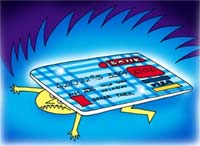A card company has offered you a lifetime free card. No processing fee, no annual fee.
 Great! Especially if you always spend within your credit limit and pay your bills on time.
Great! Especially if you always spend within your credit limit and pay your bills on time.
If you constantly revolve (only settle the minimim payment on your bill and carry forward the rest) on your card, never pay your bills on time and frequently take cash advances on your card, though, you may be in for a not-so-pleasant surprise.
Remember, the processing and annual fees are not the only costs that come with a credit card; there are other costs that have to be considered as well.
Cost of revolving credit
Every bank allows you pay a minimum amount, generally 5%, of your bill if you so choose. You can carry forward the rest of the amount on your bill to the next billing cycle. But this facility does not come for free.
You are charged a rate of interest on the outstanding balance amount; this could either be 2.5% or 2.75% per month. On an annual basis, this works out to 30% or 33% -- a very steep loan indeed!
If you revolve your credit often, check out the interest rate on revolving credit; the higher the percentage, the greater the soup you will land yourself in.
Cost of a cash advance
Do you often find yourself walking into an ATM to take a cash advance on your credit card?
The fee, generally a percentage on the amount withdrawn, could be around 2.5% of the withdrawn amount or a minimum of Rs 100. This minimum fee could rise to Rs 200 if you are using the ATM of a different bank.
Let's say you have an HDFC Bank credit card. You walk into an HDFC ATM to withdraw Rs 1,000. The fee is 2.5% on Rs 1,000, subject to a minimum of Rs 100. Since the fee in this case amounts to Rs 25, you will have to pay a fee of Rs 100.
If you instead used another bank ATM to make a withdrawal with your HDFC Bank card, you would probably have to pay a minimum of Rs 200.
Cost on late fees
Let's say the last day to pay your bill was October 1 but it totally slipped your mind, so you paid it later. A late payment fee will be slapped on you. This will be around 25% of the minimum amount due.
If your bill was Rs 5,000, you will have to pay a minimum of 5%, which works out to Rs 250. Your late payment fee will be 25% of Rs 250; this works out to Rs 62.50.
Unfortunately, the bank would have stated that the minimum late payment fee must be Rs 250. So there you go -- another Rs 250 to dole out.
Cost on exceeding your limit
You will have a credit limit laid by your bank. This depends on your income and repayment pattern. A good repayment pattern will result in the limit being increased over time.
But if you exceed your limit in a billing cycle - time period from one bill to the next, the 'extra' cash does not come free. You are charged a fee on the amount by which you overshot your limit.
Let's say your limit is Rs 5,000 but you spend Rs 6,000 this month. You will be charged a fee on the extra amount; Rs 1,000 in this case. This could be around 2.5% of Rs 1,000, which works out to Rs 25. Here, too, there will be a minimum amount which could be Rs 250. So you don't pay Rs 25, but Rs 250.
Other charges
There could be a surcharge levied on the payment you make at a petrol pump, on the purchase of a railway ticket or even for utility payments. Do look at all these.
There will be a cost if you lose your card or it gets stolen or damaged and you want a new card. In some genuine cases, the bank might agree to waive these charges.
If you lose your statement and ask for another, a charge will be levied.
So the next time you are offered a free card, make sure you check these rates with another card to ensure you are getting the same deal. Else, you may not pay the fees but you could end up shelling out dearly on other costs.
Illustration: Dominic Xavier








